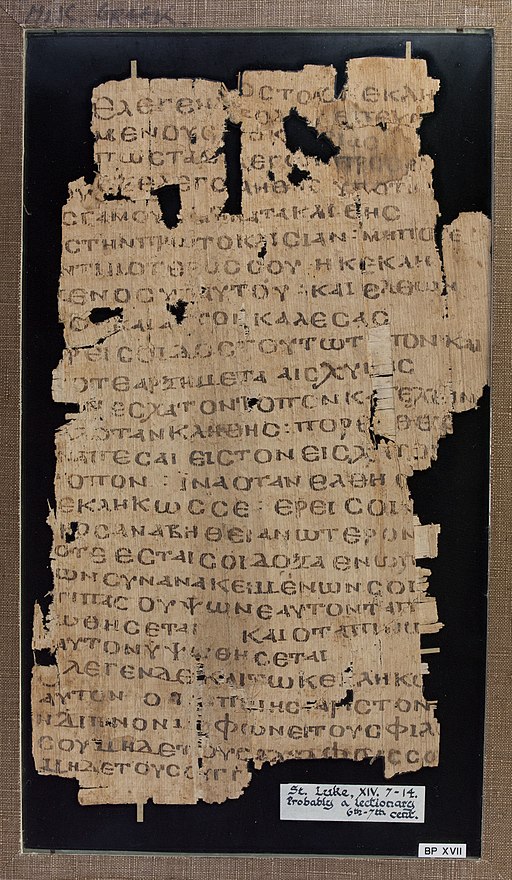Bible Question:
Can we trust the Bible if we do not have the autographs?
Bible Answer:
We do not know if any of the copies of the books of the Bible are the original books written by the human authors. The word “original” or “autograph” is not stamped or written on them. But we could have all of the autographs in our possession and not know it. We only know that we have copies of those original writings. The copies of these autographs have been made and distributed over the years. Therefore the question that we have is, “Can we trust the Bible if we do not have the autographs?” The answer to the question has three parts.

Reconstructing the Bible
There are a massive number of copies of the New Testament in Greek, Latin, and other languages. For information about these copies read “How Accurate Is the Bible?” The article provides a high level overview of the copies of the Bible. These copies have been distributed over a wide geographical area. The likelihood that errors/additions in one area spread into all of the other areas is extremely low. So, linguistic scholars have compared the copies of the various books, chapters and verses of these copies to identify any differences. Scholars used the oldest and the best preserved manuscripts from wide geographical areas to reconstruct the New Testament. This reconstructed text is called an apparatus. From the apparatus they translated the Greek text into a Bible, such as the NASB. The reconstruction process helps to eliminate spelling errors, punctuation errors, and locate missing/added words. Bible scholars follow the procedure outlined in “How Accurate Is the Bible?” to discover how to reconstruct the original autographs and thus obtain a very accurate translation of the Bible—over 99.5%.
There is doubt about how the original autographs were written in only a small number of areas (approximately 50). These areas do not affect any major doctrines. It is important to note there are more copies of the New Testament than any other ancient book in the world. That is impressive.
Now we should not be surprised that God has preserved what He has written through the prophets and the apostles. We should not be surprised that He has preserved so many copies and given us such an accurate reconstruction of the Bible. The next two sections demonstrate why we should not be surprised.
Confidence Due to Fulfilled Prophecy
First, serious evidence exists that reveals we can trust the Bible to be the Word of God because of fulfilled prophecy and the transformed lives of believers. Deuteronomy 18:20-22 reveals that if a prophecy is fulfilled, then we can trust a prophecy or a book written by a prophet or an apostle to be from God. For example, “Introduction To The Prophecy of Daniel” provides proof that the book of Daniel was written hundreds of years before Jesus Christ was born and died. The study of Daniel provides many prophecies that were literally fulfilled (chapters 2, 5, 7, 8, 9, 11). Chapter 11 has about one hundred prophecies alone. The reader is encouraged to study the book of Daniel.
The introduction of this study, “Jewish Rabbis Believed Micah 5:2 Is About the Messiah” also provides evidence that Micah 5:2 is fulfilled prophecy. The reader is encouraged to read the entire study.
These two studies of prophecies provide proof the Bible contains fulfilled prophecies and therefore is the Word of God. We do not have time to provide proof for all of the books of the Bible. But these are two examples are that we can trust the Bible. The Bible is a supernatural book. The Old Testament prophesied Christ’s coming, and Christ endorsed the apostles. We can trust both the Old and New Testaments. Historical evidence also exists that we can trust the Bible when it makes historical statements.
The Divine Principle
Second, since evidence exists that we can trust the Bible when it makes prophetic statements, we have evidence that Scripture is trustworthy. We have evidence that God wrote the Scriptures. We have evidence Scripture is inspired by God. This reveals 2 Peter 1:20-21 and 2 Timothy 3:16-17 are simply a summary of an existing divine principle that has been operating since God began writing the Scriptures through the prophets and the apostles.
That is the message of 2 Peter 1:20-21 and 2 Timothy 3:16-17. That gives us the divine principle of the plenary inspiration of Scripture. God the Holy Spirit moved men to write what He wanted written (2 Peter 1:20-21). He controlled what they wrote.As a result, 2 Timothy 3:16-17 applies and it states that all Scripture is inspired.
This principle means that God inspired the Scriptures and has maintained their accuracy down through history so that we can understand the prophecies are real. That also means God had to preserve the copies of the autographs so that we can understand the prophecies were fulfilled and historical statements are true. If He did not, then we would never understand that He wrote it.
That is also true about the content of faith. God inspired the Bible and is maintaining it.
Suggested Links:
Why We Can Trust The Bible — Inspiration and the Canon of ScripturePreparing to Study the Bible, part 1 — Why So Many Interpretations?
Preparing to Study the Bible, part 2 — Avoiding Errors In Interpretation
Preparing To Know What The Bible Says — Best Bibles and More